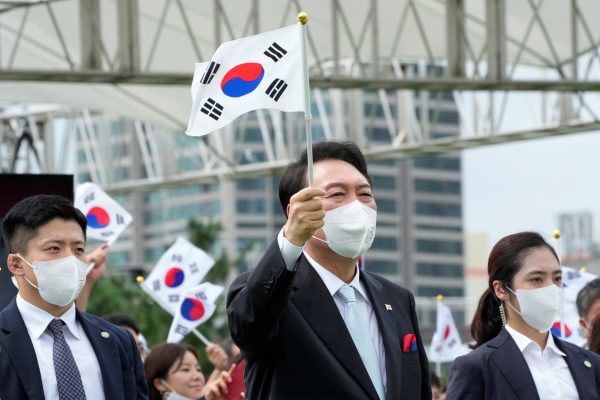Yoon has never held elected office before. He exhibits a penchant for rash, poorly-explained decisions and finds himself the president of a highly polarised polity — factors that are not a recipe for immediate success. Just three months into office, his approval ratings bottomed out at 24 per cent.
That is not the worst performance by a South Korean president — Lee Myung-bak had approval rates in the low 20s at a similar time in his term, but that should be little solace for Yoon. Lee faced massive protests over his decision to resume imports of US beef to expedite the South Korea–United States Free Trade Agreement. Yoon’s approval ratings have declined due to an unending cascade of unforced errors.
Yoon’s shock decision to lower the school entry age from six to five resulted in the resignation of the Education Minister after just 34 days in office. Yoon established a new police bureau in August 2022 to oversee the police, stirring police-led protests over concerns that their independence would be compromised as in the days of the dictatorship.
Without sufficient explanation, Yoon moved the presidential office from the Blue House and into the Ministry of Defence, preventing him from directing the emergency response to the Seoul floods in August. He snubbed Speaker of the US House of Representatives Nancy Pelosi during her visit to South Korea, with his chief of staff issuing a statement about the visit that was seen as deferential to China.
Yoon faces a very steep learning curve. Unlike Lee Myung-bak, who was mayor of Seoul before becoming president, Yoon has no prior experience in politics or government. Most of his advisors are drawn from a small circle of associates, suggesting that the President is insulated from the wider policymaking world — making appointments based on acquaintance rather than capability. Gallup Korea found that his selection of personnel was the number one reason for his public disapproval.
But Yoon’s low approvals may only have a limited impact on his domestic agenda. His domestic priorities are unclear and his party does not control the National Assembly. That takes most potential legislation off the table, leaving Yoon to govern by fiat. But taking that route feeds into the cycle of controversy based on Yoon’s poorly communicated decisions, ensuring his approval ratings remain depressed.
That leaves foreign policy — an area in which he was expected to have greater freedom to act. But any movement in that space has been similarly curtailed by low approval ratings. Take, for example, relations with Japan.
A pillar of Yoon’s foreign policy coming into office was to improve the long-suffering bilateral relationship with Japan to bolster national security. That requires separating historic issues from security — and there has been moderate success on that front. But cooperating with Japan on security issues is always on a political knife-edge for South Korean presidents.
The sensitivity of historical issues means that public anger can be quickly aroused, especially if those on the right in Japan deem South Korea’s efforts as insufficient, espouse inflammatory rhetoric or undertake actions such as a mass visit to the Yasukuni shrine. That could bring Yoon under fire at home, freezing or reversing hard-won gains.
But it is not enough for Yoon to be willing to spend political capital on improving ties with Japan. He needs to have the political capital to spend. That leaves Yoon in a predicament. His domestic agenda is stymied and a pillar of his foreign policy agenda rests on a shaky foundation.
The good news is that Yoon knows what his political floor looks like. Rebuilding his political foundation begins with clear, effective messaging — something his administration has struggled with — and finishes when all of the members of his administration are on board with that message.
The reshuffle of the presidential office will be more complicated. Reshuffles are a tried and true practice of South Korean presidents facing dire public opinion numbers. Yoon carried out his first reshuffle three months into his term, replacing nearly 50 staff members. Given public opinion on his personnel selection, this is a step in the right direction. But whether or not the overhaul will break the perception that his advisors are chosen based on their proximity to South Korea’s ‘old boys’ club is as yet unclear.
The timing of the reshuffle offers hope that Yoon is beginning to understand that optics matter. Carrying out the reshuffle just ahead of the Chuseok holidays — when people discuss politics at family gatherings — will give time and space for the changes to sink into the public consciousness.
It is too early to tell whether this will energise his presidency with a fresh start or restore domestic confidence in his presidency. If his ratings remain unchanged, it will be clear that the reshuffle was not the cure for what ails his administration — raising serious questions about his ability to restore confidence in the long-term.
Karl Friedhoff is the Marshall M Bouton Fellow for Asia Studies at the Chicago Council on Global Affairs.

